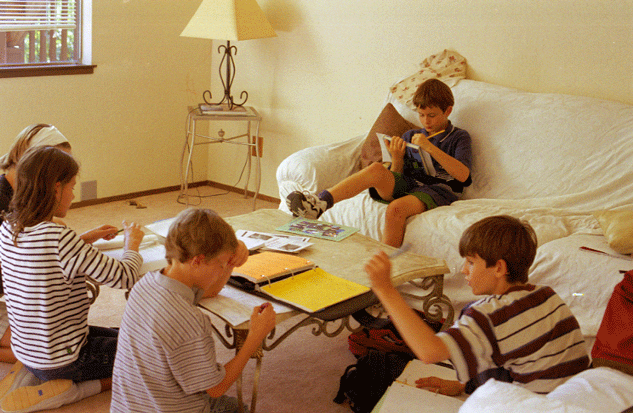
Proof that sometimes homework actually does get done! September 1999 at home, with Amélie (hidden by Daphné) in charge. This was taken before the furniture arrived, as you can tell from the bare walls.
Okay, so homework was never really a hobby, not like soccer, swimming pools, Disney, Halloween or other real childhood pleasures. It was an institutionally required activity. As such, it was unlikely to foster much enthusiam. And didn’t!
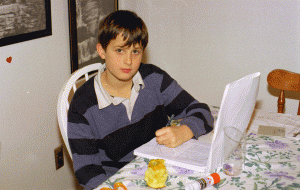
Tom doing his homework in early 2001, and demonstrating in his expression that the experience was less than entirely positive.
They applied themselves here and there, sometimes enthusiastically when a particular teacher or assignment captured someone’s easily distracted attention, but it never caught on.
I probably had something to do with that, having been raised from age 11 to 17 on an English diet of homework, more homework and even more homework. Although I appreciated that heavy diet in later years, at the time it was a miserable burden, one which I had decided that I did not want to inflict on the children. If one or other of them developed a taste for his or her schoolwork, for schoolwork in general, and wanted to study and study, I would definitely support him or her. But I didn’t see myself trying to cajole or manipulate them into doing so. The US has so much more to offer children at school than my single sex schools in post-war England, and life has taught me not only that academics aren’t everything, but also that they don’t mean much for many happy people.
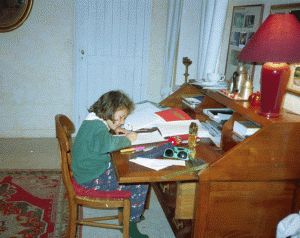
Daphné hard at work at Ian’s desk in Le Tahu, our first home together, in November 1994. She was seven.
One of the underpinnings of this approach was a belief that the direction of youthful rebellion, which would be arriving with adolescence, was in significant part created by the parents concerned. So if we insisted on the importance of homework and force fed it to them, I was afraid that they would channel their rebellion when it arrived against homework.
Blew that one! Our older children expressed their rebellion against homework in any event, in spades! There must be a message in there somewhere, but I don’t know what it is. “Do you, Mister Jones?”
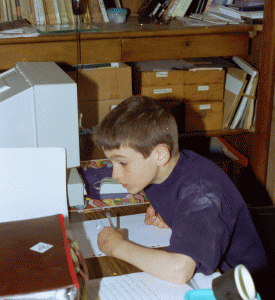
Nick hard at work at Grand-Père’s desk in April 1997 at La Grée, before we moved to Santa Cruz. Both he and Tom are left-handed.
Oddly enough, and fortunately, rebelling against homework was not necessarily the same as rebelling against effort or work. For example, Nick would not apply himself consistently to his homework, but he spent uncountable hours plugging away at learning how to write software code. It wasn’t until he found a part-time job as a coder while still at high school that I realized that this was going to be more than a hobby.
Again, you couldn’t start Tom doing schoolwork, let alone convince him to work at it, but you couldn’t stop him learning everything about playing his guitar and looking after it. He shut himself in his room, trying to spare the rest of us some of the music that he made, but he just loved those guitars and what he could do with them, and couldn’t stop doing it. Alban biked and skated, and Daphné wrote a whole bunch and skied hard and often: everybody found something to apply him or herself to.

From 1994 through early 1998, and from 2004 until 2008, I worked principally out of my home office. That’s eight of the 16 years which our blended family spent together. I like to think that my doing my own “homework” helped familiarize the children with the joys of accomplishment.
That’s the message of our family’s experience, in fact. As a parent, you can’t necessarily enable your child to do what you want him or her to do. But that doesn’t matter, as long as he or she ends up wanting to do something, and somehow learns how to do it. Ours basically taught themselves to do what grabbed them, and that as a parent is all that you need. Even if interests were dropped here and there, it was the pleasure of pursuing them which each hopefully learned: fingers crossed!
Needless to say, over time our first four teenagers eased off on homework. Not that they’d ever put themselves out much to get it done! Homework basically started for them in 1999, when Amélie lived in the cottage and looked after them for us. It was Nick and Tom’s first year in the US with the rest of us, and we knew that we’d need help. But Amélie left as planned at the end of the school year and was never replaced with another full-time au pair. We needed her room for Nick, so that he and Tom could each have their own room (Daphné and Alban already had one).
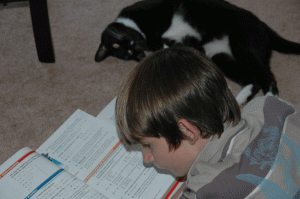
It’s 2009, and Alex is at middle school. As soon as he could take classes seriously, he did, and he found a group of friends who all did the same. Even Snip offered support!
As they aged, it became more difficult to force the teenagers to do anything, of course. We did try engaging Fergus as a tutor in 2004 for Alban and Thomas, then both 15 and competing to do as badly as possible in their High School grades. Not all filial rivalry is beneficial! Fergus is an old college friend, both very eclectic and very well read, not at all the kind of stiff-upper-lip teacher who would turn off an adolescent. But they did not benefit, I think because because they did not want to. So we essentially gave up. Each of the four older children was then allowed to do his or her homework in his or her own room, which was a euphemism for not doing very much unless he or she felt like it.
Finally, Alex became our one and only child who actually took to homework like a duck to water, probably because the parents had by then almost completely given up! Thanks Alex!

Charlie and Alex with Anton in October 2004, working hard to get their homework done so that they could all play on the computer or watch a DVD or kick a ball around. Only that kind of incentive could convince them to apply themselves with this level of diligence.

